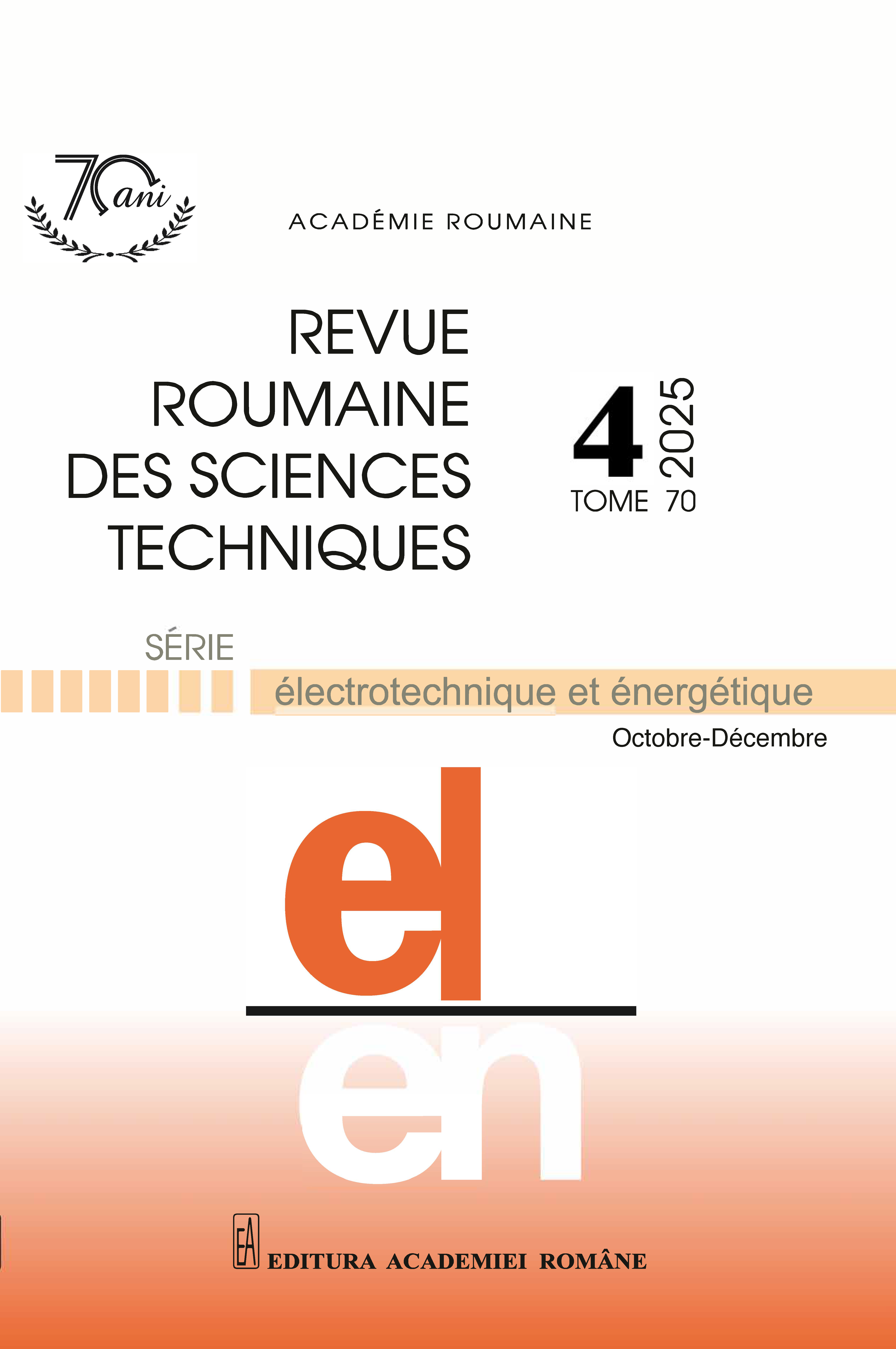NOTES IMPORTANTES ET TERMES PRÉCIS NOUVELLEMENT DÉFINIS CONCERNANT LES SYSTÈMES LINÉAIRES CONTRÔLÉS
DOI :
https://doi.org/10.59277/RRST-EE.2025.4.19Mots-clés :
Systèmes linéaires, Performances, Dépassement maximal, Temps de stabilisation, Réponse à un échelon, Réponse à une rampe, État stableRésumé
Dans certains cas, les définitions conventionnelles des performances peuvent conduire à des interprétations erronées dans le contrôle des systèmes linéaires. Il devient donc impératif de rectifier ces définitions. Cet article présente de nouvelles définitions précises des mesures de performance, ainsi que des informations importantes sur les phases transitoires et celles en régime permanent. En abordant spécifiquement les réponses en échelon, nous affinons les définitions conventionnelles du dépassement, du temps de montée et du temps de stabilisation pour les systèmes dont les valeurs de réponse finales sont nulles. En outre, nous accordons toute l'attention nécessaire à la marge de phase en boucle ouverte dans les systèmes stables. Pour la réponse en rampe des systèmes contrôlés, où les valeurs finales tendent vers l'infini, nous introduisons de nouvelles définitions précises du dépassement et du temps de stabilisation qui s'appliquent à ces cas. De nombreux exemples de simulation sont fournis pour chaque note annexée.
Références
(1) O. Somefun, K. Akingbade, and F. Dahunsi, Uniformly Damped Binomial Filters: Five-percent Maximum Overshoot Optimal Response Design, Circuits, Systems, and Signal Processing, 41, 6, pp. 3282–3305 (2022).
(2) A.A.M. Yusuf, N.J. Agung, and S. Unang, Implementation of real value genetic algorithm to determine three PID parameters, In 2015 International Conference on Control, Electronics, Renewable Energy and Communications (ICCEREC), pp. 198–202 (2015).
(3) S. Tiwari, M.V. Fischetti, and S.E. Laux, Overshoot in transient and steady-state in GaAs, InP, Ga/sub 0.47/In/sub 0.53/As, and InAs bipolar transistors, In International Technical Digest on Electron Devices, pp. 435–438 (1990).
(4) C. Liu and Y. Liu, Finite-time stabilization with arbitrarily prescribed settling-time for uncertain nonlinear systems, Systems & Control Letters, 159, 105088 (2022).
(5) G. Giustolisi and G. Palumbo, Design of CMOS three-stage amplifiers for near-to-minimum settling-time, Microelectronics Journal, 107, 104939 (2021).
(6) H. Aminzadeh and D.M. Colombo, Analysis and Design Procedures of CMOS OTAs Based on Settling Time, Journal of Integrated Circuits and Systems, 17, 1, pp. 1–11 (2022).
(7) R. Arivalahan, S. Venkatesh, and T. Vinoth, An effective speed regulation of brushless DC motor using a hybrid approach, Advances in Engineering Software, 174, 103321 (2022).
(8) A. Barreiro, A. Baños, and E. Delgado, Reset control of the double integrator with finite settling time and finite jerk, Automatica, 127, 109536 (2021).
(9) D. Wang, Synthesis of phase-lead/lag compensators with complete information on gain and phase margins, Automatica, 45, 4, pp. 1026–1031 (2009).
(10) M. Cupelli, A. Riccobono, M. Mirz, M. Ferdowsi, and A. Monti, Modern control of DC-based power systems: A Problem-Based Approach, Academic Press is an imprint of Elsevier (2018).
(11) R.C. Dorf and R.H. Bishop, Modern Control Systems, 12th edition, Prentice Hall (2011).
(12) I. Saidi and N. Touati, Learning control for trajectory tracking of nonlinear inertia wheel inverted pendulum, Rev. Roum. Sci. Techn. – Électrotechn. et Énerg., 68, 4, pp. 424–430 (2022).
(13) R.O. Dukkipati, Analysis and design of control systems using Matlab, Published by New Age International (P) Ltd (2006).
(14) A.K. Mandal, Introduction to control engineering: modeling, analysis and design, Published by New Age International (P) Ltd (2006).
(15) I.D. Landau and G. Zito, Digital Control Systems: Design, Identification and Implementation, Springer (2006).
(16) Y. Granjon, Automatique, systèmes linéaires, non-linéaires…, 2e édition, DUNOD (2010).
(17) C. Houpis, S. Sheldon, and J. D'Azzo, Linear Control System Analysis and Design: Revised and Expanded, CRC Press (2003).
(18) G.F. Franklin, J.O. Powell, and A. Emami-Naeini, Feedback control of dynamic systems, 7th edition, PEARSON (2014).
(19) A. Khelloufi, B. Sari, and S. Chouaba, H∞ Control-Based Robust Power System Stabilizer For Stability Enhancement, Rev. Roum. Sci. Techn. – Électrotechn. et Énerg., 67, 2, pp. 175–180 (2022).
(20) H. Egon, M. Marie, and P. Porée, Traitement du signal et automatique, Hermann (2000).
(21) M. Atia, N. Bouarroudj, A. Ahriche, A. Djari, and Y. Houam, Maximum power harvesting from a PV system using an improved two-stage MPPT scheme based on incremental conductance algorithm and integral controller, International Journal of Modelling, Identification and Control, 40, 2, pp. 176–191 (2022).
(22) N. Bouarroudj, B. Benlahbib, Y. Houam, M. Sedraoui, V. Feliu Batlle, T. Abdelkrim, D. Boukhetala, and F. Boudjema, Fuzzy-based incremental conductance algorithm stabilized by an optimal integrator for a photovoltaic system under varying operating conditions, Energy Sources, Part A: Recovery, Utilization, and Environmental Effects (2021).
(23) N. Bouarroudj, B. Benlahbib, M. Sedraoui, V. Feliu-Batlle, M. Bechouat, D. Boukhetala, and F. Boudjema, A new tuning rule for stabilized integrator controller to enhance the indirect control of incremental conductance MPPT algorithm: Simulation and practical implementation, Optik - International Journal for Light and Electron Optics, 268, 169728 (2022).
(24) S. Latreche, A. Bouafassa, B. Babes, and O. Aissa, Efficient DSP-Based Real-Time Implementation of an ANFIS Regulator For Single-Phase Power Factor Corrector, Rev. Roum. Sci. Techn. – Électrotechn. et Énerg., 69, 2, pp. 141–146 (2024).
Téléchargements
Publiée
Numéro
Rubrique
Licence
(c) Copyright REVUE ROUMAINE DES SCIENCES TECHNIQUES — SÉRIE ÉLECTROTECHNIQUE ET ÉNERGÉTIQUE 2025

Ce travail est disponible sous licence Creative Commons Attribution - Pas d'Utilisation Commerciale - Pas de Modification 4.0 International.


